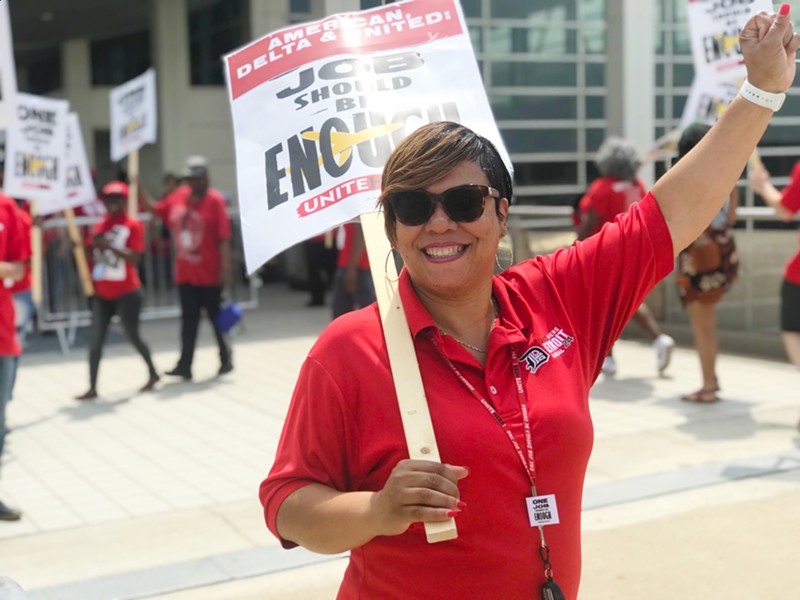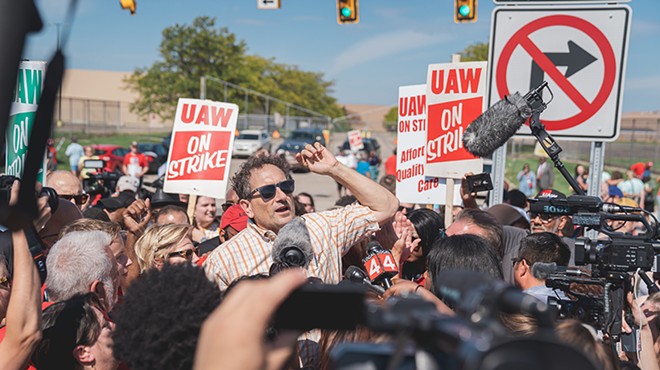More than 20 years ago, Nia Winston says she had hit what she calls “rock bottom” while working in a Detroit casino.
She was a 25-year-old single mother working for $10 an hour, and felt like she had lost control of her life.
Now, she’s general vice president of UNITE HERE, a U.S. and Canadian labor union that represents about 300,000 hospitality workers in the hotel, food service, laundry, and casino industries, as well as the president of UNITE HERE Local 24, which represents workers in Michigan, Ohio. Pennsylvania, and West Virginia.
Winston reflects upon the time when the union drive came to her workplace years ago. “I thought about all of those times that I was at work, and all those times that my employer just used me,” she tells Metro Times. “I thought about all those times where it was one-sided, where maybe I wanted to get off early to take care of my son with asthma, and did not even know about the Family and Medical Leave Act. … So I started thinking about all these things. I was like, ‘Wait a minute here. I didn’t have a say, so it’s not just their rules, it’s rules that we come up with together — a collective bargaining agreement.’ I was like, ‘Wow, like, this is it.’”
We asked Winston for tips on how to organize one’s workplace.
Talk to your coworkers
The first step is getting to know your coworkers by talking with them. That way you can learn about shared grievances.
“Sometimes you may want a particular thing, or something that you may feel is unjust in the workplace, and it may work fine for someone else, because workplaces are extremely diverse,” she says. “And so you have to listen, you have to have patience, and you have to come to some type of agreement with your coworkers that through a union, our voices are more powerful. All of these things that we may seek individually, having a union is having the power and a voice that can change that.”
That can start by just sharing your own personal experiences. “You’d be surprised when you start talking about your own personal experience, and what you’ve been through,” Winston says. “Folks just don’t share that often because they may not know someone. You’d be surprised how the next person next to you at your next location or station, they’re like, ‘Oh my God, I’ve been through that, too.’ Those common experiences or life challenges, when folks start to talk about that and they start to share it, they get things in common and then they start seeking solutions. When you harbor that, when you keep it to yourself and you don't talk about it, you can also feel at times that you're alone and that there's no solution to anything that you’re going through.”
Meet up off the clock
Sometimes workers can be physically isolated from each other, making opportunities to chat difficult. Winston says the lunch room is a great way to commiserate with fellow workers, but that’s not always possible, either. Reaching them outside of work might be key, like getting drinks after work, or connecting with them on social media. “You know, social media — it could be a gift and the curse,” Winston says. “It’s given us the opportunity to talk to folks or see what our coworkers’ likes and interests are outside of the workplace.”
That includes talking about money
Talking about money can be uncomfortable, but Winston says it can be crucial in understanding how a workplace exploits its workers. “If I’m only making $15 an hour, why is the guy standing next to me making $17 an hour, and we’re doing the same thing?” she says. “As you start to have those discussions and gather information, it kind of just happens organically. Those workers will stay in touch, and then they go and talk to the other coworkers.”
Don’t fear retaliation
Winston says many workers may recoil from unionization efforts because they’ve simply become used to their exploitation and believe nothing can be done about it. Others might fear retaliation from employers.
“Thank goodness for the National Labor Relations Board, because we have laws that protect workers,” Winston says. That’s another reason unions are important, she says. “Make no mistake about it — there have been workers that have been terminated because of organizing campaigns, and through the efforts of the union, we’ve been successful in getting those workers reinstated,” she says.
“I often tell folks who are fearful ... imagine what Martin Luther King Jr. would’ve done, and John Lewis would’ve done, and Rosa Parks would’ve done if they would’ve remained silent?” she says. “I will say there is a fear factor, but you have some folks who are fearless. And thank goodness for them because I don’t think we would’ve been … where we are if they hadn’t remained fearless or let fear stand in the way.”
People power
Solidarity is the most important thing — with your fellow coworkers, with other workers who are fighting their own battles at other companies.
“When you have this shared experience and this collective camaraderie, then that’s when things begin to change,” Winston says. “I think often workers don’t know that the power lies in them and they could change not only their working conditions, but quite frankly, they could change their livelihood. They can change their future.”
She also says if at first you don’t succeed, be ready to dust yourself off and try again. “It’s hard work,” she says. “It takes a lot of tenacity and effort.”
Hospitality workers can learn more about joining a union by visiting unitehere.org.
Stay connected with Detroit Metro Times. Subscribe to our newsletters, and follow us on Google News, Apple News, Twitter, Facebook, Instagram, or Reddit.








